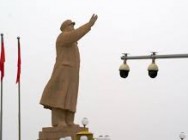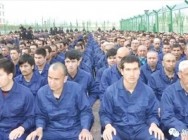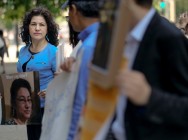Last Minute

- Conflict and Alliance: The US and China: A Centennial Dance: A Century of Relationship from 1900 to 2024
- CHINA RELATIONSEAST TURKESTAN PROBLEM AND TURKEY
- FRONTLINE China Undercover
- Elimination of “Uyghur Counter-Revolutionary Officials” in Academic Fields—Exact Quotes Translated from a Mandarin Audio File
- In Push for Trade Deal, Trump Administration Shelves Sanctions Over China’s Crackdown on Uighurs
- Dalai Lama’s 60th Anniversary Symposium: İlshat Hassan speech in English and Chinese
- Uyghur Detainees from Xinjiang ‘Placed in Nearly Every Prison’ in Shandong Province
- Shahrezad Ghayrat, Unrepresented Women
- Uighur Americans Speak Against China’s Internment Camps. Their Relatives Disappear.
- Rozinisa: The true story of the Uyghur girls in the prison

-

Conflict and Alliance: The US and China: A Centennial Dance: A Century of Relationship from 1900 to 2024
-

CHINA RELATIONSEAST TURKESTAN PROBLEM AND TURKEY
-

FRONTLINE China Undercover
-

Elimination of “Uyghur Counter-Revolutionary Officials” in Academic Fields—Exact Quotes Translated from a Mandarin Audio File
-

In Push for Trade Deal, Trump Administration Shelves Sanctions Over China’s Crackdown on Uighurs
-

Dalai Lama’s 60th Anniversary Symposium: İlshat Hassan speech in English and Chinese
Daughters-in-Law of Xinjiang Mine Attack Suspect Face ‘Harsh Punishment’
Two women related to a suspected ring leader of a deadly attack at a coal mine in northwest China’s troubled Xinjiang Uyghur Autonomous Region are facing “harsh punishment” for not revealing his plan to authorities ahead of time, according to local sources.
The attack occurred on Sept. 18, when a group of knife-wielding suspects set upon security guards at the gate of the Sogan Colliery in Aksu (in Chinese, Akesu) prefecture’s Bay (Baicheng) county, before targeting the mine owner’s residence and a dormitory for workers.
Some 50 mostly majority Han Chinese were killed in the incident—including at least four police officers and a police chief—and around 50 others injured.
In late November, Chinese official media reported that police killed 28 members of a “terrorist group” following a two-month manhunt for suspects in the coal mine attack. Local sources said the suspects, who included women and children, were members of five or six ethnic Uyghur families who lived in the area.
Between 700 and 800 people detained for questioning by authorities in the aftermath of the incident were released within two weeks of the raid on a cave where the suspects were hiding, while around 100 others remain in custody because they are believed to have been aware of plans for the attack but did not report them to police, according to sources.
“In particular, the ring leader Musa Toxtiniyaz’s two daughters-in-law are facing harsh punishment because they were told about the attack plan and urged to take part, but they chose not to,” one source told RFA’s Uyghur Service, speaking on condition of anonymity.
“However, [they are in trouble because] they didn’t reveal the attack plan until they were summoned and interrogated,” the source said of Gulmire Toqi and Rashide Rozi—the wives of Toxtiniyaz’s sons Rexmutulla Musa and Esmutulla Musa, respectively. He said the two may face 15-20 years in prison.
Abduraxman Turdi, the chief of No. 2 village in Bay’s Bulung township where the women live, said Musa Toxtiniyaz had told Toqi and Rozi of his plans at a family meeting ahead of the attack.
“He said, ‘We are planning to do something and could either die while carrying it out or escape and try to travel abroad, but in either case you could be made to suffer because of your relationship to us, so it is up to you—you can join us or you can return to live with your parents.’”
Toqi and Rozi made the decision to return to the homes of their parents, Turdi said. Toxtiniyaz was among the suspects later killed in the November police raid.
“The [mine] incident would have been prevented if the daughters-in-law had revealed it at the time, but they kept it a secret out of loyalty to the family,” he said.
“Now the authorities are saying they expressed loyalty and sympathy to the terrorists, and supported and protected them indirectly.”
Turdi noted that since 2009 authorities in Xinjiang have punished the families of anyone who acted against the government, which is why Toxtiniyaz and other suspects in the mine attack had taken their relatives with them when they tried to flee.
Nine-year-old girl
Yasijan Emet, the chief of No. 3 village in Bay’s Toqsun township, told RFA that the father of nine-year-old Munire Memet—one of the other 28 suspects killed in the police raid—is also being held in detention because he is believed to have known of plans for the mine attack.
“The adopted child Munire Memet’s biological father Turghun Memet is also among the detainees because he was aware of the attack plan,” Emet said.
“He was called on by [another suspected ringleader] Memet Eysa to attend meetings, and while he refused, he never reported it to the police.”
Hashim Obul, a herdsman from Chokatal village in Bay’s Kanchi township, told RFA that Munire Memet was killed by police in the very same cave she was born in nine years earlier, in a ravine near Yevendi mountain.
“In September 2006, when Munire Memet’s mother was pregnant with her and was going to have an abortion [to avoid violating state limits on ethnic minority families having more than three children], Memet Eysa and his wife brought her family to the cave,” Obul said.
“The two families lived there for one month and left after Munire was born and her mother had recovered. Memet Eysa adopted the child in order to prevent Turghun Memet from getting punished for violating the birth control law.”
Adoptive father
Obul said he was surprised to find that Eysa was one of the suspects in the mine attack because he was “a kindhearted person and became distraught when Turghun Memet agreed to the abortion.”
He convinced Memet not to go ahead with the abortion and promised to accept all the risk of punishment from authorities for keeping the baby, he said.
When word leaked out that Eysa had secretly adopted Munire Memet, town officials hauled him into their office on Sept. 7 for three days of “political education,” head of the Chokatal ranch unit Eliniyaz Turdi told RFA in the aftermath of the mine attack.
When the education proved ineffective, authorities fined him and took him to Kanchi township’s legal and political office to educate him for 15 days, but because there was no space in the detention center or county jail, he was let go on parole on Sept. 10, Turdi said.
Eysa is believed to have been one of the masterminds behind the mine attack, which took place eight days later, and was among the 28 suspects killed in the subsequent police manhunt.
China has vowed to crack down on the “three evils” of terrorism, separatism, and religious extremism in Xinjiang, but experts outside China say Beijing has exaggerated the threat from Uyghur “separatists” and that domestic policies are responsible for an upsurge in violence that has left hundreds dead since 2012.
Rights groups accuse the Chinese authorities of heavy-handed rule in Xinjiang, including violent police raids on Uyghur households, restrictions on Islamic practices, and curbs on the culture and language of the Uyghur people.
Reported by Shohret Hoshur for RFA’s Uyghur Service. Translated by Shohret Hoshur. Written in English by Joshua Lipes.
http://www.rfa.org/english/news/uyghur/punishment-12082015174652.html
RELATED NEWS












